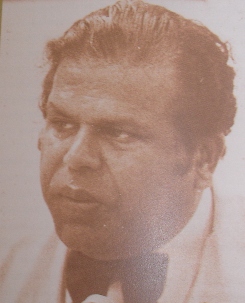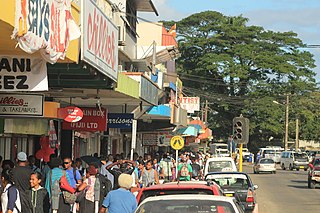
Articles about people, places, things, and concepts related to or originating from Fiji, include:

Siddiq Moidin Koya was a Fijian Indian politician, Statesman and Opposition leader. He succeeded to the leadership of the mostly Indo-Fijian National Federation Party (NFP) on the death of the party's founder, A. D. Patel, in October 1969, remaining in this post until 1977. He later served a second term as leader of the NFP, from 1984 to 1987.

Fiji is divided administratively into four divisions, which are further subdivided into fourteen provinces. Each province has a provincial council.

Lautoka is the second largest city in Fiji. It is on the west coast of the island of Viti Levu, in the Ba Province of the Western Division. Lying in the heart of Fiji's sugar cane-growing region, the city has come to be known as the Sugar City. Covering an area of 32 square kilometres, it had a population of 71,573 at the 2017 census, the most recent to date.

Labasa is a town in Fiji with a population of 28,500 at the most recent census held in 2010.
Sir Vijay Raghubar Singh, KBE was an Indo-Fijian lawyer and politician who held Cabinet office in the 1960s and 1970s. Vijay Singh served in Prime Minister Ratu Sir Kamisese Mara's government in a variety of positions, including Attorney-General, and was president of the Indian Alliance, a division of the ruling Alliance Party. He quit the party in 1979 following disagreement with Alliance leadership and later joined the opposition National Federation Party. Vijay Singh was involved in the restructure of the Fiji sugar industry and was a leading member of the Jaycees movement in Fiji.

Ambalal Dahyabhai Patel, better known as A.D. Patel, was an Indo-Fijian politician, farmers' leader and founder and leader of the National Federation Party. Patel was uncompromisingly committed to a vision of an independent Fiji, with full racial integration. He was one of the first to advocate a republic, an ideal not realized in his lifetime. He also advocated a common voters' roll and opposed the communal franchise that characterized Fijian politics.

Ba is a town in Fiji, 37 kilometres from Lautoka and 62 kilometres from Nadi, inland from the coast of Viti Levu, Fiji's largest island. Covering an area of 327 square kilometres, it had a population of 14,596 at the 1996 census. The town is built on the banks of the Ba River, after which it is named. For a long time, Ba was famous for its soccer team which caused major traffic problems. The old bridge was washed away in the floods of 1990s and a new bridge built downstream. This resulted in the main highway bypassing Ba Town. Jiaxing City in China is Ba Town's sister city.

Nausori is a town in Fiji. It had a population of 57,866 at the 2017 census. This makes it the fourth most populous municipality in the country. Situated 19 kilometers outside of Suva, it forms one pole of the burgeoning Suva-Nausori corridor. Nausori is home to three provinces Rewa, Tailevu and Naitasiri.
The Ba River is located in the island of Viti Levu in Fiji. The town of Ba is built on its banks. The Rarawai Sugar Mill is located a kilometer upstream on the bank of the Ba River and makes use of the river water in its boilers.
Ayodhya Prasad Sharma was an Indo-Fijian farmers' leader and politician. He formed the most successful farmers' union in Fiji and forced the Colonial Sugar Refining Company to make concessions to farmers after 60 years of total control over Fiji's economy. However, other Indo-Fijian leaders formed rival unions and his initial success was not repeated. He also served as a member of the Legislative Council between 1953 and 1959.
Kisan Sangh was the first farmers' union formed in Fiji on 27 November 1937. This was the result of one man's determination to improve the plight of Fiji's Indian cane farmers. Ayodhya Prasad had arrived from India in 1929, and after a stint as a teacher took up cane farming and thus obtained firsthand experience of the problems faced by Fiji Indian cane farmers.
Brahma Dass Lakshman was an Indo-Fijian politician, trade unionist and businessman, who had a considerable influence on Fiji’s sugar industry. He served in the Legislative Council in two spells between 1940 and 1963.
The Federation of Cane Growers was formed as an umbrella organisation to negotiate the new cane contract due to take effect from 1960 with the Colonial Sugar Refining Company.
Nadi is a district within Ba Province, located on the south-west coast of the island of Viti Levu in Fiji. Nadi is well known for its international airport, which long provided a communication link for travellers from North America to Australia and New Zealand. Because of its proximity to the airport and a number of uninhabited tropical islands, tourism is the main industry in the district. The district is served by the town of Nadi which has a population of approximately 12,000. In the rural areas of Nadi most farmers are involved in the sugar cane industry.
Yalalevu is a settlement in the District of Ba in Fiji, bounded by the Ba River on the east, Namosau River on the south and the settlement and village of Nailaga towards the north and west. Most of Yalalevu is within the Ba town boundary and this area is known as the Yalalevu Ward for Local Government administrative purposes. The terrain is mostly flat and not more than 5 metres above sea-level, consequently the area is prone to flooding. The soil is fertile and being of so low elevation and close to rivers, the area is safe from droughts. The land is mostly free-hold, a rarity in Fiji.
The Citizens Federation was the political expression of a predominantly Indo-Fijian trade union movement, and was a forerunner of the present day National Federation Party.
Tavua is a district in the Western Division on the north west coast of the island of Viti Levu in Fiji. It is part of the province of Ba. It is situated some 20 kilometers by road from Ba town. Its main economy is sugar cane, although the establishment of Tavua township was the result of a gold mine in Vatukoula, which is in the interior of Viti Levu but easily accessible from Tavua. A wharf, used by the mine, also exists at Vatia a few kilometres near the coast. The wharf is of historical significance as it was used as the main route of transportation from Suva to the western districts before the coastal road was built. The district is home to Tavua F.C., who play at Garvey Park (Fiji) in Tavua.
Unlike the majority of Fiji's Indian population, who are descendants of Indian indentured labourers brought to Fiji between 1879 and 1916, most of the Sikhs came to Fiji as free immigrants. Most Sikhs established themselves as farmers. Sikhs also came to Fiji as policemen, teachers and preachers. In recent years large numbers of Sikhs have emigrated from Fiji, especially to the United States, Canada, the United Kingdom, Australia and New Zealand. Sikhs in Fiji are generally referred to as Punjabis.
This is a synopsis of organisations formed by Indians in Fiji. When they became free from the bondage of indenture and were able to organise themselves, they founded numerous organizations to seek social and political justice. These organisations promoted the teaching of Indian languages and religious practices and also to help others in time of need. Some of the successful organisations are listed below in the order in which they were established. Some, such as the National Federation Party, are no longer exclusively Indian, but are still predominantly so.







